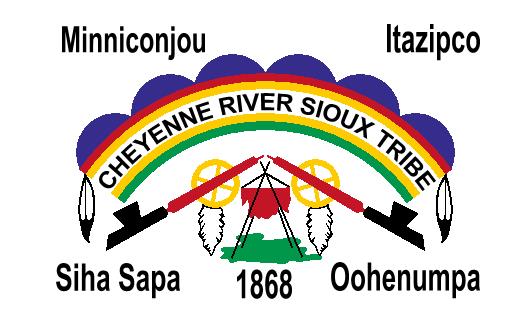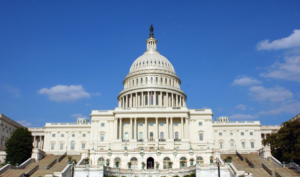Sioux Coronavirus Checkpoints Conflicts

Cheyenne River Sioux Tribe Flag
South Dakota Governor Demands Reservation Checkpoints Removed
Amid the coronavirus pandemic, the Oglala Sioux and Cheyenne River Sioux tribe in South Dakota have instituted coronavirus checkpoints for anyone entering or passing through the tribe’s lands.
South Dakota governor, Kristi Noem, has demanded the checkpoints along US and state highways through tribal lands to be removed in a letter sent to the two tribes. Noem threatened to take the tribes to federal court if they did not comply saying in her letter, “The checkpoints on state and US highways are not legal, and if they don’t come down, the state will take the matter to federal court.”
The memorandum that Noem accuses the tribes of violating is that regarding road closures on tribal lands issued by the US Department of the Interior’s Bureau of Indian Affairs. In the memorandum it says that tribes are allowed to “restrict road use or close” tribally-owned lands temporarily without consulting the Secretary of Interior or private landowners only when there are “immediate safety or life-threatening situations.”
However, tribes may only do this after consulting the state officials. Noem’s Policy Director, Maggie Seidel, stated that no such attempt has been made thus it is unlawful. Noem emphasized in her letter, “we are strongest when we work together; this includes our battle against covid-19.”
Responses from the Two Tribes
Despite this letter warning from the governor, the Cheyenne River Sioux Tribe Chairman, Harold Frazier, responded in agreement of the need to work together but defended their efforts to “do what science and facts dictate” in order to protect their reservation. Frazier ultimately asserted, “We invite you to join us in protecting the lives of our people and those that live on this reservation. I regretfully decline your request.”
Meanwhile, the Oglala Sioux President, Julian Bear Runner, responded, “Due to the lack of judgement in planning of preventative measures in response to the current pandemic, Covid-19, the Oglala Sioux Tribe has adopted reasonable and measures to protect the health and safety of our tribal members and our other residents of the Pine Ridge Indian Reservation” according to the Argus Leader.
Cheyenne River Sioux Tribe Medical Resources
This response comes after Frazier has already tried to justify their checkpoints due to their lack in medical resources, personnel, and facilities. They claim that due to this lack of medical resources, the checkpoints are their next best option in preventing coronavirus outbreaks within their reservations. Frazier told CNN, “the nearest health care, critical care is three hours away from where we live.” He added the Cheyenne River Sioux Tribe only has an eight-bed facility on the reservation and no intensive care unit for their 12,000 population reservation.
About the Checkpoint Rules
The Cheyenne River Sioux Tribe policies dictate that reservation residents may travel in South Dakota to locations not deemed “Covid-19 hotspots” for essential activities like arrange medical appointments or gather supplies unavailable within the reservation. Even for those traveling for such essential activities, they must complete health questionnaires before leaving and upon return.
For non-reservation South Dakota residents, the policy says they are only allowed in the reservation for essential activities and must also complete health questionnaires. However, those coming from South Dakota hotspots may not enter through the reservation and are requested to go around instead unless it is for an essential activity. Even then, they had to obtain travel permits from the tribe’s website. Both the Cheyenne River Sioux and Oglala Sioux tribes have issued stay-at-home orders while Noem has not.
Coronavirus Numbers in South Dakota
South Dakota has 198 cases among Native Americans according to state health officials. The state has over 12,194 confirmed cases of coronavirus and 162 deaths according to Johns Hopkins University.





